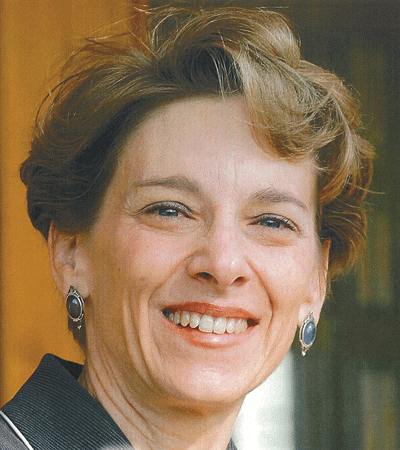FARMINGTON — Despite making vast strides to offer highly competitive academic programs in recent decades, public colleges are once again in danger of falling behind private ones, according to Kathryn Foster, one of three finalists competing to become president of University of Maine at Farmington.
Public colleges are seeing big drops in vital government funding, making it tougher for them to keep competing with private ones with large endowments. And that gap in resources is expected to only get bigger in the future, unless there are fundamental changes in how public colleges approach funding.
That’s how Foster, 54, described her goal to ensure UMF continues to thrive and give people access to a high quality alternative to costly private universities, which are beyond the reach of most people.
During a visit Friday to the campus on the edge of downtown Farmington, she shared her plan for the small liberal arts college to lead the way in redefining how public universities manage funding.
She is the third candidate to visit the campus during the final stages of a search to succeed outgoing President Theodora J. Kalikow, who is retiring in June after 18 years leading the college.
Foster credits spending 19 years at the University at Buffalo, State University of New York, with molding her approach to higher education, starting as a professor and working her way up to administrative positions.
Her goal as a college administrator is to ensure people have access to an affordable and high quality education at public universities and institutions, Foster said. She added she wants to lead the college in Farmington because it’s among the elite few recognized by the Council on Public Liberal Arts Colleges, which is a national group championing public higher education causes.
Foster promoted public education while leading a research and policy center associated with the state college in Buffalo. From 2005 to 2011, she developed regional development plans based on growing a community by building a skilled workforce educated at public colleges, she said.
She continues to champion the cause as a visiting fellow at the Brookings Institution, a think tank based in Washington, D.C. Foster noted the one-year fellowship is researching and shaping national governance issues, saying she has focused on where education fits into the conversation.
Foster touted her experience with guiding public policy as a vital skill to lead the college in Farmington, which similar to state colleges nationwide is in the midst of fundamental shifts away from traditional public funding models.
She believes the biggest challenge is finding new ways to keep offsetting declines in government support for public colleges. Foster added she was drawn to the college in Farmington because it managed to excel academically despite the tough financial climate.
Foster plans to focus on four broad categories — academic programs, community partnerships, marketing and fundraising — to help the college in Farmington build on its success under Kalikow, she said.
The college has to keep expanding its presence in Maine and other states, attracting top students and faculty by marketing the college’s rich history and strong liberal arts program, Foster said.
She also plans to expand on the college’s unique academic programs, including environmental research projects, international student exchanges and professional internships.
Foster called building partnerships with businesses, philanthropists and other community organizations a key to achieving all of her goals. Without the fundraising from outside sources, declines in University of Maine System revenues will make it difficult to support academic programs, she said.
Foster noted her entire career is committed to finding ways to benefit people by building a stable public infrastructure.
She has a bachelor’s degree in geography and environmental engineering from Johns Hopkins University.
She also has a master’s degree in city and regional planning from the University of California, Berkeley, and a doctorate in public and international affairs from Princeton University.
A president search committee will now present its findings to the University of Maine System chancellor. One candidate will be recommended to the full Board of Trustees for approval, and the new president is expected to start this summer.
David F. Robinson – 861-9287
drobinson@centralmaine.com
Send questions/comments to the editors.



Success. Please wait for the page to reload. If the page does not reload within 5 seconds, please refresh the page.
Enter your email and password to access comments.
Hi, to comment on stories you must . This profile is in addition to your subscription and website login.
Already have a commenting profile? .
Invalid username/password.
Please check your email to confirm and complete your registration.
Only subscribers are eligible to post comments. Please subscribe or login first for digital access. Here’s why.
Use the form below to reset your password. When you've submitted your account email, we will send an email with a reset code.